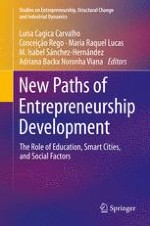2019 | OriginalPaper | Chapter
Promoting Regional Development Through a Collaborative Project in Entrepreneurship Education: Lessons from a Regional Experiment to Develop Entrepreneurial Competencies in Children and Youngsters
Authors : Sandra Saúde, Sandra Lopes, Ana Piedade, Bárbara Esparteiro, Maria do Céu André, Margarida Silveira
Published in: New Paths of Entrepreneurship Development
Publisher: Springer International Publishing
Activate our intelligent search to find suitable subject content or patents.
Select sections of text to find matching patents with Artificial Intelligence. powered by
Select sections of text to find additional relevant content using AI-assisted search. powered by
